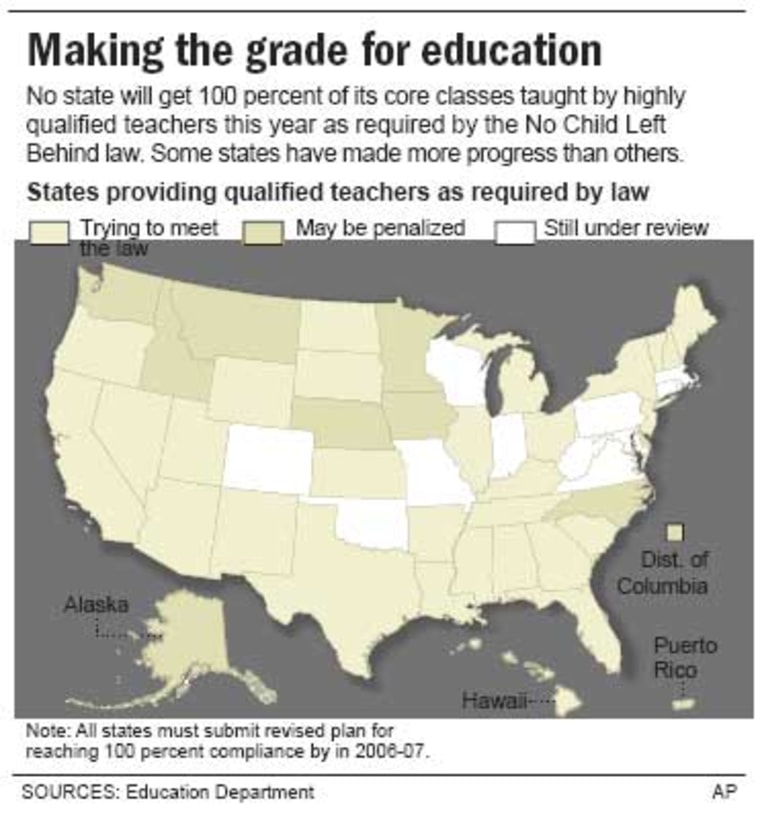Not a single state will have a highly qualified teacher in every core class this school year as promised by President Bush’s education law. Nine states along with the District of Columbia and Puerto Rico face penalties.
The Education Department on Friday ordered every state to explain how it will have 100 percent of its core teachers qualified — belatedly — in the 2006-07 school year.
In the meantime, some states face the loss of federal aid because they didn’t make enough effort to comply on time, officials said.
They are Alaska, Delaware, Idaho, Iowa, Minnesota, Montana, Nebraska, North Carolina and Washington, plus the District of Columbia and Puerto Rico.
“At some point there was, I suspect, a little bit of notion that ‘This too shall pass,”’ said Henry Johnson, the assistant secretary over elementary and secondary education. “Well, the day of reckoning is here, and it’s not going to pass.”
Department officials would not say how much aid could be withheld from states to force compliance. But Johnson said, “In some cases, we’re talking about large amounts of money.”
Data incorrectly reported
States often fell short because they did not report accurate or complete data about the quality of the teacher corps, said Rene Islas, who oversees the department’s review.
The 4-year-old No Child Left Behind law says teachers must have a bachelor’s degree, a state license and proven competency in every subject they teach by this year. The first federal order of its kind, it applies to teachers of math, history and any other core class.
In grading the states, the department found that 29 have made substantial progress. They must improve but do not face looming sanctions.

Twelve other states are still under review and haven’t been rated: Colorado, Connecticut, Indiana, Maryland, Massachusetts, Missouri, Oklahoma, Pennsylvania, Rhode Island, Virginia, West Virginia and Wisconsin.
No matter which category they are in, all the states must submit a new plan of action.
Most states give themselves good grades on teacher quality; 33 states say 90 percent to 99 percent of their classes are taught by highly qualified teachers. Most of the rest put their numbers a tier below, in a range of 70 percent to 89 percent.
“I know the states have made great efforts in trying to meet all the prongs of the highly qualified teacher requirement,” said Scott Palmer, a consultant for the Council of Chief State School Officers. “I’ve got to believe there are some that are very close.”
As for the ones that aren’t, Palmer said he hopes the department will recognize the ways states are trying to improve teacher effectiveness, even beyond the basics the law requires.
States were notified Friday. The department plans to follow up in coming days.
Good teachers in poor, minority areas
What the agency wants to see most, Johnson said, is what states are doing to get experienced teachers into classrooms with large numbers of poor and minority children.
The fact that no state complied with the law on time — four years after Bush signed it with great fanfare — is due in part to the enormity of the challenge.
Some teachers, particularly in small or rural areas, handle many subjects and have not met the law’s details in each one. Many schools struggle just to find teachers in math, science or special education. And turnover is common, often blamed on salary and stress.
Although the federal term is “highly qualified,” the definition is widely regarded as more of a minimum qualification, because it requires teachers to know what they teach.
Phyllis McClure, who supports the law and tracks it for the Citizens’ Commission on Civil Rights, said the department is right to demand accurate data and results from the states.
“They don’t like having to do all this,” said McClure, a supporter of the law. “I must say that they have become used to getting their way with the federal government.”